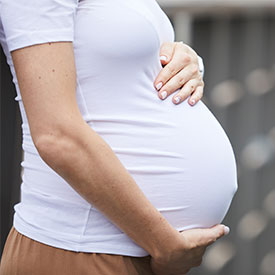 Kate (name changed for patient privacy) was five months’ along when she found out she was pregnant. She struggled for years with addiction to heroin and prescription drugs but had no idea she was using while pregnant until she failed a drug test during a doctor’s visit.
Kate (name changed for patient privacy) was five months’ along when she found out she was pregnant. She struggled for years with addiction to heroin and prescription drugs but had no idea she was using while pregnant until she failed a drug test during a doctor’s visit.
Kate was referred to the UAB Comprehensive Addiction in Pregnancy Program (CAPP) in the Division of Maternal-Fetal Medicine. In Alabama, it is a felony offense to use drugs during pregnancy, as a result of the state’s Chemical Endangerment Law. CAPP’s multidisciplinary, outpatient approach aims to help vulnerable mothers who voluntarily enter the program with prenatal and postnatal care. It helps them navigate government systems and resources, social work support, opioid replacement therapy, and ultimately, recovery.
In April 2019, CAPP celebrated its first year of care, enrolling 48 women in the program. Since July 2018, 22 women have successfully completed a treatment program.
“The women we treat face tremendous barriers to care during pregnancy, including social stigma, legal consequences, transportation, poor communications between providers, and limited facilities for addiction treatment programs,” says Lorie Harper, M.D., maternal-fetal medicine specialist and CAPP director. “In this first year, we have exceeded our own expectations and have created a sustainable model of care for vulnerable patients who not only need our direction and resources, but are also truly buying into our program of sobriety and success.”
CAPP is the only program of its kind in Alabama. It provides a full complement of obstetric addiction therapy, including opioid replacement therapy, subspecialty pediatric follow-up, care coordination, social services, peer recovery support, and in-home parenting education. Many of the mothers CAPP supports would not seek recovery-based services during pregnancy out of fear of criminal consequences and the shame often associated with substance use. However, for mothers like Kate, enrolling in CAPP’s intensive outpatient program was key in detoxing and reaching sobriety, which she has maintained in the year since her son’s birth.
 For Kate, CAPP nurses’, social workers’, physicians’, and her program peers’ unwavering support gave her a sense of belonging and encouragement in a judgment-free zone. “CAPP provided such a safe space where I could grow and learn. I wasn’t just learning how to be a mother. I was learning how to be the best version of myself,” she says. “Knowing the CAPP team was investing in all aspects of my sobriety and journey made all the difference. Dr. Harper even stayed by my side during all 30 hours of my labor; that’s just one testament to what this program provides.”
For Kate, CAPP nurses’, social workers’, physicians’, and her program peers’ unwavering support gave her a sense of belonging and encouragement in a judgment-free zone. “CAPP provided such a safe space where I could grow and learn. I wasn’t just learning how to be a mother. I was learning how to be the best version of myself,” she says. “Knowing the CAPP team was investing in all aspects of my sobriety and journey made all the difference. Dr. Harper even stayed by my side during all 30 hours of my labor; that’s just one testament to what this program provides.”
“The women we serve are getting prenatal care and resources, and they are working on themselves with everything else that’s going on in their lives that led them to this point. They are really resourceful, strong, and self-sacrificing, and want to overcome their addiction for themselves and their baby,” Harper says. “We’ve tried to cultivate a community where there’s no shame and stigma. Rather, we are creating a place where these mothers can get the critical medical care that both they and their babies need, and have guidance and access to resources to help them live a sober life.”
In reflecting on the care that CAPP provides to so many mothers, Suzanne Muir, UAB Substance Abuse Programs associate director and principal investigator for the Children’s Bureau funding, says she sees ways for the program to expand in the future.
“We serve such a vulnerable population. While I think we are meeting a lot of gaps in care for our patients, we find new ways to add to our care portfolio with each patient we see,” Muir says. “Our goal is for mothers to leave the hospital with their child. If we can get them the treatment they need, they can become healthy and stable for themselves and their child.”
By Savannah Koplon